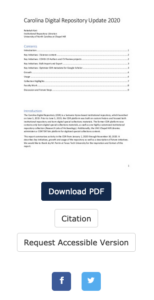Case Study 7.11: Accessibility Request Workflows
The Repository Services unit at the University of North Carolina, Chapel Hill, has worked recently to make it easier for people to request accessible copies of materials in Carolina Digital Repository (CDR). Embedded on every page in the repository is a link to an “Accessibility Remediation Request” form that anyone can fill out should they have difficulty with the file provided in CDR.

Accessibility requests go to Rebekah Kati, Institutional Repository Librarian, who reviews the request and creates a ticket in a project management system, JIRA. Deseree Stukes, Repository Content Technician, receives the request and completes the necessary remediation. Kati then sends the item to the requester.
The Ohio University Libraries suggested another method for embedding accessibility requests. Chris Guder, Subject Librarian for Education, explained that the library’s accessibility services are listed on the university’s Student Accessibility Services (SAS) website. Anyone coming from SAS lands on a page describing services for persons with disabilities. By cross-listing in this way, the OU Libraries are able to direct people to options for receiving additional support from, for instance, interlibrary loan. This cross-listing method may also prove useful for repository managers and library publishers who wish to more clearly articulate library support options for people with disabilities.
